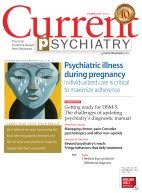Monday, June 1, 2009
Exercise prescription: A practical, effective therapy for depression
Kanwaldeep S. Sidhu, MD
Fourth-year resident, Department of psychiatry and behavioral neurosciences, Wayne State University, Detroit, MI
Pankhuree Vandana, MD
Third-year resident, Department of psychiatry and behavioral neurosciences, Wayne State University, Detroit, MI
Richard Balon, MD
Professor, Department of psychiatry and behavioral neurosciences, Wayne State University, Detroit, MI
Antidepressants alone do not adequately treat many patients with depression. In the STAR*D Project—which compared long-term outcomes of various depression treatments—only 28% to 33% of outpatients achieved remission with selective serotonin reuptake inhibitor (SSRI) monotherapy. Rates were somewhat higher with bupropion or serotonin norepinephrine reuptake inhibitor (SNRI) monotherapy, but greater benefit was obtained from augmenting SSRIs.
Combining antidepressants with psychotherapy and lifestyle changes—particularly exercise—makes sense intuitively and is supported by well-designed studies. This article examines the evidence supporting exercise for treating and preventing clinical depression. We begin by addressing clinicians’ concerns about motivating depressed patients to exercise.
Read full text (free access)
Listen to Kanwaldeep S. Sidhu, MD, offer advice on talking to patients about exercise
Comment on this article
Email the editor
Subscribe to:
Post Comments (Atom)


No comments:
Post a Comment